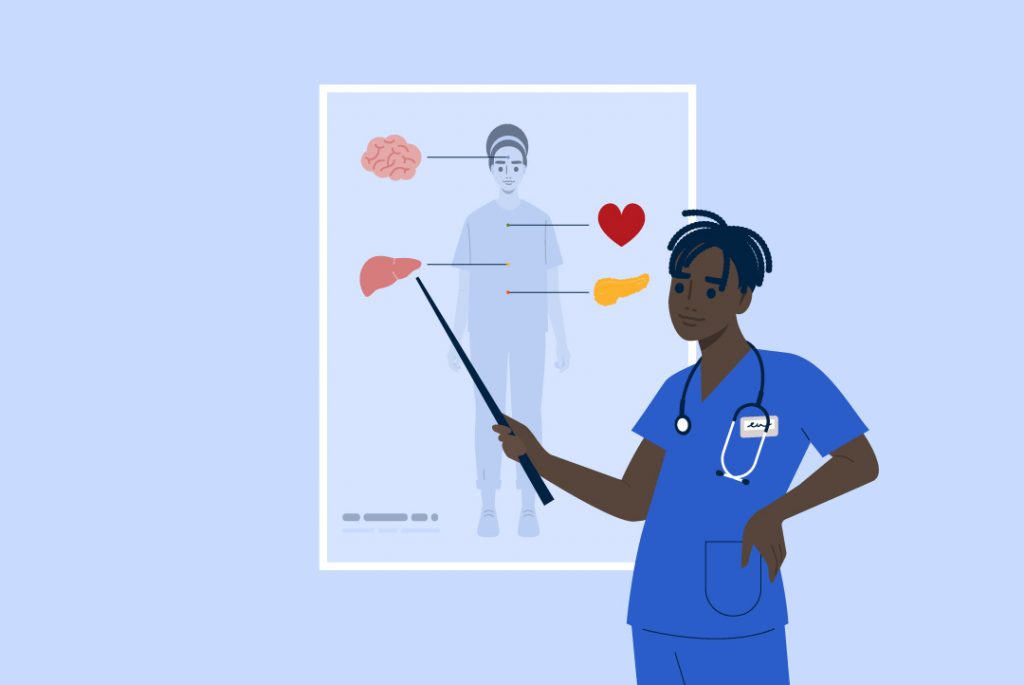EXPLORE MORE
SEPTEMBER 2022
What does alcohol do to your body?
Is that nightly glass of chardonnay a problem? How about the occasional day of heavy drinking with your best buddies? Is it safe to drink more than three cocktails if your designated driver gets you home? The answers may surprise you. The fact is, drinking too much — whether on a single occasion or over time — can take a serious toll on your health.
Looking for more? Find other articles below

Here’s how alcohol can affect your body:
Brain
Alcohol interferes with the brain’s communication pathways and can affect the way the brain looks and works. These disruptions can change mood and behavior and make it harder to think clearly and move with coordination.
Heart
Drinking a lot over a long time or too much on a single occasion can damage the heart, causing problems such as:
- Cardiomyopathy — stretching and drooping of heart muscle
- Arrhythmias — irregular heartbeat
- Stroke
- High blood pressure
Liver
Heavy drinking takes a toll on the liver and can lead to a variety of problems and liver inflammations, including:
- Steatosis, or fatty liver
- Alcoholic hepatitis
- Fibrosis
- Cirrhosis
Pancreas
Alcohol causes the pancreas to produce toxic substances that can eventually lead to pancreatitis. This is a dangerous inflammation and swelling of the blood vessels in the pancreas that prevents proper digestion.
Cancer
Drinking alcohol has been linked with several types of cancer. That’s why the American Cancer Society’s (ACS) Guideline for Diet and Physical Activity for Cancer Prevention states that it may be best not to drink alcohol. A study by ACS researchers supports this recommendation.
The study, published in Cancer Epidemiology, found that alcohol accounts for a “considerable proportion” of cancer diagnoses and deaths in all US states. From 2013 to 2016, drinking alcohol was tied to more than 75,000 new diagnoses of cancer and almost 19,000 deaths from cancer each year.1
Clear patterns have emerged between alcohol consumption and increased risks of certain types of cancer:
- Head and neck cancer, including oral cavity, pharynx and larynx cancers.
- Esophageal cancer, particularly esophageal squamous cell carcinoma. In addition, people who inherit a deficiency in an enzyme that metabolizes alcohol have been found to have substantially increased risks of esophageal squamous cell carcinoma if they consume alcohol.
- Liver cancer.
- Breast cancer: Studies have consistently found an increased risk of breast cancer in women with increased alcohol intake. Women who consume about one drink per day have a 5% to 9% higher chance of developing breast cancer than women who do not drink at all.
- Colorectal cancer.
Immune system:
Drinking too much can also weaken your immune system, making your body a much easier target for disease. Chronic drinkers are more liable to contract diseases like pneumonia and tuberculosis than people who do not drink too much. Drinking a lot on a single occasion slows your body’s ability to ward off infections — even up to 24 hours after getting drunk.
1Cancer Epidiomiology. Proportion of cancer cases and deaths attributable to alcohol consumption in the U.S. state, 2013–2016.
In the end, it’s important to be informed, and to weigh the risks of drinking alcohol against the benefits.
Source: NIH NIAA. Alcohol’s effects on the body.
For more information on alcohol misuse and support services that can help you or someone in your household develop a healthier relationship with alcohol, see the resources below.

